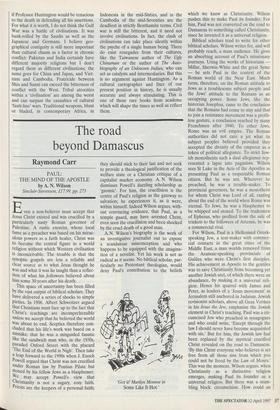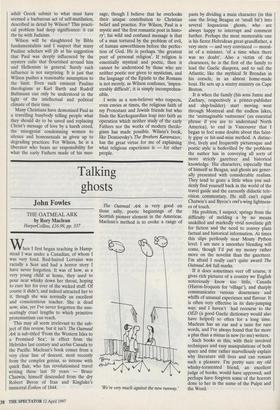The road beyond Damascus
Raymond Carr
PAUL: THE MIND OF THE APOSTLE by A. N. Wilson Sinclair-Stevenson, £17.99, pp. 273 Even a non-believer must accept that Jesus Christ existed and was crucified by a particularly nasty Roman governor of Palestine. A rustic exorcist, whose local fame as a preacher was based on his mirac- ulous powers as a faith healer, Christ was to become the central figure in a world religion without which Western civilisation is inconceivable. The trouble is that the Synoptic gospels are less a reliable and Clear source as to what Jesus thought he was and what it was he taught than a reflec- tion of what his followers believed about him some 30 years after his death.
This space of uncertainty has been filled by the vast output of biblical scholars. They have delivered a series of shocks to simple Pieties. In 1906, Albert Schweitzer argued that Christians must face up to the fact that Christ's teachings are incomprehensible unless we accept that he believed the world was about to end. Sceptics therefore con- cluded that his life's work was based on a mistake; that he was a misguided fanatic like the sandwich man who, in the 1930s, Paraded Oxford Street with the placard 'The End of the World is Nigh'. Then take a leap forward to the 1990s when J. Enoch Powell argued that Christ was not crucified under Roman law by Pontius Pilate but stoned by his fellow Jews as a blasphemer. We may accept Powell's view that Christianity is not a sugary, cosy faith. Priests are the keepers of a personal faith; they should stick to their last and not seek to provide a theological justification of the welfare state or a Christian critique of a capitalist market economy. A. N. Wilson dismisses Powell's dazzling scholarship as 'gnomic'. For him, the crucifixion is the centre of Paul's religion as the gateway to salvation; he experiences it, as it were, within himself. Indeed Wilson argues, with- out convincing evidence, that Paul, as a temple guard, may have arrested Christ, even seen the crucifixion and been shocked by the cruel death of a good man. A.N. Wilson's biography is the work of an investigative journalist out to expose a scandalous misconception and who happens to be equipped with the imagina- tion of a novelist. Yet his work is not as radical as it seems. No biblical scholar, par- ticularly no Protestant theologian, would deny Paul's contribution to the beliefs 'Got it! Marilyn Monroe in Some Like It Hot' which we know as Christianity. Wilson pushes this to make Paul its founder. For him, Paul was not converted on the road to Damascus to something called Christianity, since he invented it as a universal religion.
Biblical scholars tend to write for other biblical scholars. Wilson writes for, and will probably reach, a mass audience. He gives an absorbing account of Paul's missionary journeys. Using the works of historians — Millar, Sherwin-White and the great Syme — he sets Paul in the context of the Roman world of the Near East. Much turns, therefore, on the Roman attitude to Jews as a troublesome subject people and the Jews' attitude to the Romans as an occupying power. Some Jews, like the historian Josephus, came to the conclusion that the Romans had come to stay and that to join a resistance movement was a profit- less gesture, a conclusion reached by many Frenchmen after 1940. To other Jews, Rome was an evil empire. The Roman authorities did not care a jot what its subject peoples believed provided they accepted the divinity of the emperor as a token of political allegiance. To strict Jew- ish monotheists such a dual allegiance rep- resented a lapse into paganism. Wilson sees St Luke in the Acts of the Apostles as presenting Paul as a respectable Roman citizen. But he was not. Wherever he preached, he was a trouble-maker. To provincial governors, he was a monotheist for whom Christ was Lord of all, ranting about the end of the world when Rome was eternal. To Jews, he was a blasphemer to be whipped and stoned. To the tradesmen of Ephesus, who profited from the sale of trinkets to the followers of Artemis, he was a commercial rival.
For Wilson, Paul is a Hellenised Greek- speaking Jew, a tent-maker with commer- cial contacts in the great cities of the Middle East, a man worlds removed from the Aramaic-speaking provincials of Galilee who were Christ's first disciples. His achievement as Apostle to the gentiles was to save Christianity from becoming yet another Jewish sect, of which there were an abundance, by making it a universal reli- gion. Hence his quarrel with James and Peter, as leaders of a 'Jesus movement' in Jerusalem still anchored in Judaism. Jewish revisionist scholars, above all Geza Vermes in his Jesus the Jew, emphasise the Jewish element in Christ's teaching. Paul was a cir- cumcised Jew who preached in synagogues and who could write, 'Except through the law I should never have become acquainted with sin.' But for him, the Jewish law had been replaced by the mystical crucified Christ revealed on the road to Damascus. 'By this Christ everyone who believes is set free from all those sins from which you could not be freed by the Law of Moses.' This was the moment, Wilson argues, when Christianity as a distinctive religion emerges, making Paul its founder as a universal religion. But there was a stum- bling block: circumcision. How could an adult Greek submit to what must have seemed a barbarous act of self-mutilation, described in detail by Wilson? This practi- cal problem had deep significance: it cut the tie with Judaism.
Wilson will be slaughtered by Bible fundamentalists and I suspect that many Pauline scholars will jib at his suggestion that Paul was deeply influenced by the mystery cults that flourished around him and Hellenism in general. Surely such influence is not surprising. It is just that Wilson pushes a reasonable assumption to the limit. Even such eminent Pauline theologians as Karl Barth and Rudolf Bultmann can only be understood in the light of the intellectual and political climate of their time.
Many Christians have demonised Paul as a travelling busybody telling people what they should do to be saved and replacing Christ's message of love by a harsh creed, the misogynist condemning women to silence and homosexuals as given up to degrading practices. For Wilson, he is a liberator who bears no responsibility for what the early Fathers made of his mes- sage, though I believe that he overlooks their unique contribution to Christian belief and practice. For Wilson, Paul is a mystic and 'the first romantic poet in histo- ry'; his wild and confused message is that of a man tortured by the problem of evil, of human unworthiness before the perfec- tion of God. He is perhaps 'the greatest poet of personal religion'. If religion is essentially mystical and poetic, then it cannot be understood by those who are neither poetic nor given to mysticism, and the language of the Epistle to the Romans is not merely, as Wilson confesses, 'impen- etrably difficult', it is simply incomprehen- sible.
I write as a non-believer who respects, even envies at times, the religious faith of my Protestant and Jewish friends but who finds the Kierkegaardian leap into faith an operation which neither study of the early Fathers nor the works of modern theolo- gians has made possible. Wilson's book, like Dostoevsky's The Brothers ICaramazov, has the great virtue for me of explaining what religious experience is — for other people.



































































 Previous page
Previous page